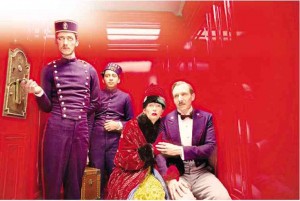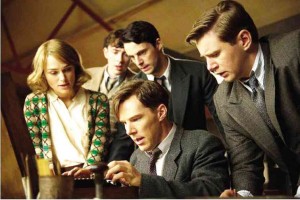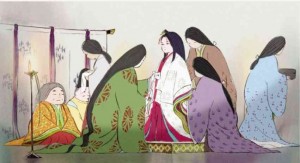More Oscar bets, locks, snubs
(Conclusion)
There were 83 submissions for best foreign language film, the biggest-ever number of entries in the category. If only cinematic excellence were the one true gauge, we are sure easily a third of these can vie for best picture, among them our own entry, Lav Diaz’s “Norte, Hangganan ng Kasaysayan” (Norte, End of History).
Mauritania’s first
As if to mock those who contend that money and lobbying are huge factors in getting short-listed for this category, entries from Mauritania (“Timbuktu”) and Estonia (“Tangerines”) got in this year.
This is Mauritania’s first entry since the award was created in 1956. But then, “Timbuktu” is directed by Abderrahmane Sissako, one of the masters of world cinema.
An audience favorite is “Ida” (by Pawel Pawilowski, Poland), about a Jewish orphan raised in a Catholic convent who, two weeks before taking her vows, goes in search of the remains of her parents killed during the war.
In themes and visuals, the film conjures the worlds of Andrzej Wajda, Ingmar Bergman, Michael Haneke’s “The White Ribbon,” even Luis Buñuel’s “Viridiana.” Composed of tableaux, still lifes and quiet scenes, it has crisp black-and-white visuals with pristine lighting and stark figure composition. This should win for best cinematography.
Our favorite is “Leviathan” (Andrey Zvyagintsev, Russia), about a man stripped of family and possessions through the complotment of church and state. Ostensibly about a town ridden
by corruption, abuses of power and authority and twisting of the law, the simple story turns mythic and resonates throughout Russia. That decaying town, in fact, can be a microcosm of every country in the world.
The film makes one angry. It is scorned, and was nearly banned, in Russia—precisely the fate of the prophets in their own country.
One discerns the Book of Job not only in the plot but also through the title (the sea monster God metaphorized as answer to Job ever questioning the meaning of life; here also the symbol of a monolithic system). The main difference is, Job got restored at the end; here corruption, hypocrisy and oppression goes on.
There’s also the story of Ahab and Jezebel from the Book of Kings. Finally, it is a loose adaptation of Kleist’s novella “Michael Kohlhaas.” A richly layered film, it possesses true grandeur.
If we’re looking for the best foreign films of the year, it’s not necessarily here, because the category depends on what has been submitted by a country. The film chosen is usually what’s agreeable with the state, or a feel-good one. That leaves out a lot. They’re too innumerable to enumerate, so we’ll just cite the obvious.
Masters overlooked
Works of the masters released last year either snubbed or overlooked: “Two Days, One Night” (Jean-Pierre and Luc Dardenne), “Clouds of Sils Maria” (Olivier Assayas), “Jimmy’s Hall” (Ken Loach), “Mr. Turner” (Mike Leigh), “The Golden Era” (Ann Hui), “Far from the Madding Crowd” (Thomas Vinterberg), “Venus in Fur” (Roman Polanski), “Goodbye to Language” (Jean-Luc Godard), “Life of Riley” (Alain Resnais), “Winter Sleep” (Nuri Bilge Ceylan), “Coming Home” (Zhang Yimou), “A Pigeon Sat on a Branch Reflecting on Existence” (Roy Andersson), “The Church of the Devil” (Manoel de Oliveira).
Best animated feature
For best animated feature, “Big Hero 6” (Don Hall and Chris Williams) is big with fans of superheroes, especially if they’re a bunch of misfits who transform into extraordinary beings when duty calls. Everybody cheers for the underdog that fights back.
But “How to Train Your Dragon 2” (Dean DeBlois) could win, being most popular with boys and girls who love swashbuckling adventures and adore friendly dragons. Most Academy members are thought to be children.
“The Boxtrolls” (Graham Annable and Anthony Stacchi) may be better, but it is spooky (if deeply humanist). The Academy is not known to be comfortable in Tim Burton territory.
So the contest boils down to what gets the most number of votes—from those who love superheroes, those who love dragons or those who love trolls.
What we love most, however, is “The Tale of the Princess Kaguya” (Isao Takahata), based on the oldest Japanese folk tale, about a tiny nymph found in a bamboo shoot by a bamboo
cutter and raised by him and his wife to grow into a princess. Coming from the long-time collaborative partner of recently retired film master Hayao Miyazaki, the film could be a masterpiece.
Takahata, who does not draw his illustrations, imbues his animé with gravitas as he’s a fan of the Italian Neorealists, apparent in “My Neighbors the Yamadas” and “Grave of the Fireflies” (the first Japanese animé to really impress us).
Typically using hand-drawn animation, rotoscoping and minimal CGI, Japanese animé may look primitive to the modern eye. Compared to contemporary Hollywood animation, however, it possesses a color tonality that’s as subtle as watercolor wash with lighting that’s as poetic and precise as noir. But then the beauty of traditional animation technique is lost on a generation weaned on Pixar.
Snubbed: “The Lego Movie” (Phil Lord and Christopher Miller), “The Book of Life” (Jorge Gutierrez), “Jack and the Cuckoo-Clock Heart” (Stéphane Berla and Mathias Malzieu), “Giovanni’s Island” (Mizuho Nishikubo).
What many feel to be the biggest snub is for everybody’s favorite, “The Lego Movie.” We feel the same.
Probably as concession, the Academy has given its nod to its soaring “Everything Is Awesome” for best original song. It may win, if it can outclass the surging, spiritual “Glory” (from “Selma”).
Best picture
For best picture, most of the nominees look like foreign films, that is, non-American or un-Hollywoodish.
Even “Whiplash,” an intimate drama about jazz artists, is un-Hollywoodish in visual composition and narrative approach. Mostly confined in interiors, the characters often behave as if in spontaneous combustion.
The film may look small but it explores no less than the wellspring of genius. The battle between teacher and student attains a mythic quality: the slaying of the father.
“The Theory of Everything” is British, from looks to subject to director and actors. This story of physicist and cosmologist Stephen Hawking treats audiences to the agony of a person afflicted by ALS (amyotrophic lateral sclerosis, or Lou Gehrig’s disease), a nervous-system disorder that weakens the muscles and affects physical function.
More than that, it concretizes mathematical abstractions, makes lucid the concept of time and space, and guides viewers to visualize the black hole. However, by dwelling on Hawking’s personal life, director James Marsh reduces the vision of the universe into a romantic story.
“American Sniper” recalls “The Hurt Locker” and “Zero Dark Thirty,” with similar arid milieu and twisted psychopathology, though more ambiguous morality. As if the story of the deadliest marksman in US military history were not polarizing enough, Clint Eastwood stirs up the controversy by drenching his film with red-blooded patriotism.
“Selma” dramatizes the last few months of Martin Luther King Jr. and the march of civil-rights protesters to Washington. It is grippingly staged and finely acted, but plot and characterization are rather schematic. It has humanized President Lyndon B. Johnson but also sanctified King. It doesn’t suffer from the victimization syndrome of “12 Years a Slave,” though.
If “The Imitation Game” plays like a European thriller, it’s because director Morten Tyldum is Norwegian. This is one of those war films that do not show the battlefield but confine the action and drama to rooms (think Bergman’s “Shame”), yet can be as riveting as any war spectacle.
The story recounts the workings and relationships of the team that cracked the Enigma code of the Nazis to shorten the war. What an ungrateful nation did to genius mathematician Alan Turing at the end is devastating. This is another film that makes one angry.
“Birdman” could have sunk into another kitchen-sink melodrama if not for the sophisticated, non-Hollywoodish technique employed by Mexican filmmaker Alejandro González Iñarritu. The story unfolds in real time through a series of takes taken as one shot. The artsy set will make this film about actors and acting, theater and real life, get the award.
Prettiest movie
If “Boyhood” looks European, it’s because director Richard Linklater is a fan of the French master Eric Rohmer. He shot his film typically in vérité style through 12 years, shooting the
same actors for two weeks a year.
Closely observed truths can be gleaned from this documentation of a boy’s life. There’s the parallelism of father and son growing up together; and of brother and sister turning from frisky kids to rather bland young adults.
The biggest truth comes from the mother, practically stating the film’s theme: The survival of the human race depends on a mother protecting her child.
Some find this film dragging; others complain the filmmaker seems to have forgotten the wildness of youth. But the technique—a feat!—can make it a winner.
Of the nominees, “The Grand Budapest Hotel” is the prettiest and the most European-looking. Not only was it shot in three European countries (the marvelous hotel interiors built in a defunct German factory); the story is also a frothy confection in the style of French farce and the German-born Lubitsch; and the droll characters seem to have strayed from a Kaurismäki film.
Ostensibly a murder mystery, the film is expansive enough to explore human greed and even touch on fascism. Incredibly entertaining.
Snubbed: “Interstellar” (Christopher Nolan), “Foxcatcher” (Bennet Miller), “Nightcrawler” (Dan Gilroy), “Unbroken” (Angelina Jolie), “A Most Violent Year” (JC Chandor).
“Nightcrawler” can hold a candle to any mass-media satire, from “Ace in the Hole” to “Mad City.” And the performances are tops.
“Interstellar” looks and feels like a composite of “Solaris,” “2001: A Space Odyssey” and “Gravity.” The effect is nothing less than mystical.
“Unbroken” recalls surreal war films such as “Fateless” and “Come and See.” It depicts an even more harrowing human experience than that portrayed by the overrated “12 Years a Slave.” Which only goes to show that war is more nightmarish, more brutalizing than slavery.
Higher calling
Says film historian and critic David Thomson: “First of all, remind yourself that ‘best picture’ is not a certificate of value passed down by God. It is a construct, and a con, dreamed up by the Academy of Motion Picture Arts and Sciences (which never had anything to do with God or academia) as part of a suggestion that the film business has attempted to make ‘good’ pictures, or even the ‘best.’
“The business was always out for profit…but, like any business enterprise set on making money, it welcomes the suggestion of a higher calling, and has been known to push best picture honors in that direction.”
Thomson calls this an “uncharacteristic and generally unwholesome high-mindedness,” then delivers the coup de grâce: “When an institution presents a humanitarian award, you know it has a bad conscience.”
So now we have to stand on our own. We can only hope we won’t be taken for idiots for staring for hours at that box. Or there’d be so many idiots watching TV today more than the Olympics, the World Cup, the Super Bowl, or the Miss Universe.





















